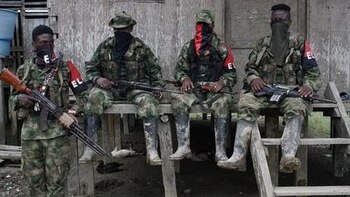
The violence that keeps inhabitants in Chocó under terror continues to generate havoc of great magnitude. In an interview with W Radio, the mayor of the municipality of Nóvita, León Fabio Hurtado, highlighted that the community has been confined for 12 days, in addition, he highlighted the health and supply problems they are suffering amid the confinement they are subjected to by the ELN guerrillas. The local president, on the other hand, stressed that the humanitarian corridor that aims to help nearly 4,000 affected people in eight districts is also being advanced.
The mayor explained that thanks to the management of the Office of the Ombudsman and the Church, it was agreed to open the passage for three days, particularly, to bring food and medicine. “This time food is being transported that will be delivered to the affected communities,” said the Ombudsman's Office.
Monsignor Mario de Jesús Álvarez, bishop of Istmina-Tadó, in Chocó, asked the guerrillas to allow “to get there through the Municipal Mayor's Office of Novita, the Major Community Council and the Social Ministry of the Diocese to meet the immediate needs of these communities in food, medicine and clothing. If this does not happen, there will be a displacement with consequences that we cannot measure.”
In an interview with Noticias Caracol, Archbishop Álvarez stated that “the Army is based in El Tambito (...) they have tried to provide security to the population, but since the domain of this area of San José del Palmar, the Ingará River, the Tamana River, is very much on the side of the ELN, they cannot proceed either because if they do so by force, could do it, this would mean bloodshed, more pain, death and I think it's not the way.”
On March 30, it was commented that the Office of the Ombudsman had already begun its humanitarian mission with its officials in the Chocó region to care for the 900 families (4,000 people) from 25 communities in the municipality of Nóvita who are in a state of total confinement. The ELN demanded that the community not move from their homes to avoid having violent repercussions.
“We call on the ELN guerrillas and the Gaitanista Self-Defense Forces (AGC) to respect the rights of communities in the territory and to allow the free movement of civilians and to cease their actions against the Novita community, in addition to respecting Human Rights and International Humanitarian Law,” said the The Ombudsman, Carlos Camargo, in a statement published on that entity's website.
On the morning of March 31, the mayor of Novita said, in an interview with RCN, that 5,000 people (950 families) are already confined. “The municipality of Novita has 11,000 inhabitants, but 70% are in Alto Tamana. Of the 13 districts there are eight that are going through difficulties (...) The security forces have been pending, but in these conflict issues communities must have guarantees to be able to move through their plots as they fear minefields. As long as there is the presence of groups outside the Law, communities will live in fear,” he said to that news program.
In that same dialogue, he commented that the situation has not been controlled by the authorities and that permission was given for a maximum of five days to proceed with the delivery of products through the corridor. “We are using the municipality's own resources, sending our communities a $180,000 kit that includes rice, beans, lentils and some items, so that our people have at least to mitigate the issue of hunger,” he said.
The mayor called on the national government to turn its gaze to the conflict zone in order to resolve what is happening. The president explained that although the calls have been constant, not enough has been done for his community. “We are fighting for our people. We call on the Government to look at Novita. They must also see that our communities are human beings. This situation needs to be taken seriously,” he concluded.
Keep reading:
Últimas Noticias
Debanhi Escobar: they secured the motel where she was found lifeless in a cistern
Members of the Specialized Prosecutor's Office in Nuevo León secured the Nueva Castilla Motel as part of the investigations into the case

The oldest person in the world died at the age of 119
Kane Tanaka lived in Japan. She was born six months earlier than George Orwell, the same year that the Wright brothers first flew, and Marie Curie became the first woman to win a Nobel Prize

Macabre find in CDMX: they left a body bagged and tied in a taxi
The body was left in the back seats of the car. It was covered with black bags and tied with industrial tape
The eagles of America will face Manchester City in a duel of legends. Here are the details
The top Mexican football champion will play a match with Pep Guardiola's squad in the Lone Star Cup

Why is it good to bring dogs out to know the world when they are puppies
A so-called protection against the spread of diseases threatens the integral development of dogs




